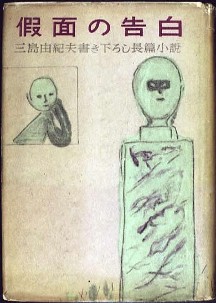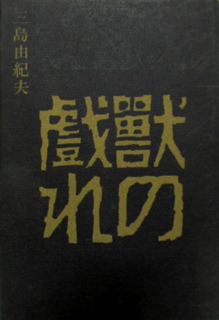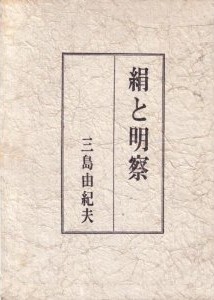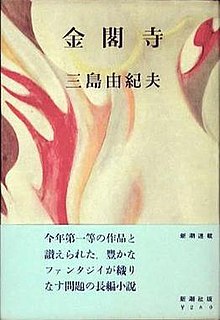 W
WAfter the Banquet is a 1960 novel by Yukio Mishima.
 W
WConfessions of a Mask is Japanese author Yukio Mishima's second novel. First published in 1949, it launched him to national fame though he was only in his early twenties.
 W
WThe Decay of the Angel is a novel by Yukio Mishima and is the fourth and last in his Sea of Fertility tetralogy.
 W
WForbidden Colors is a 1951 novel by the Japanese writer Yukio Mishima, translated into English in 1968. The name kinjiki is a euphemism for homosexuality. The kanji 禁 means "forbidden" and 色 in this case means "erotic love", although it can also mean "color". The word "kinjiki" also means colors that were forbidden to be worn by people of various ranks in the Japanese court. It describes a marriage of a gay man to a young woman. Like Mishima's earlier novel Confessions of a Mask, it is generally considered somewhat autobiographical.
 W
WThe Frolic of the Beasts is a 1961 novel by Yukio Mishima. Drawing inspiration from Noh plays, specifically the 14th-century Motomezuka, the novel centers on a tragic love triangle depraved by adultery and violence. It is a short novel in length and has a nonlinear narrative structure. The novel was first serialised thirteen times in the weekly magazine Shukan Shincho between 12 June 1961 and 4 September 1961. It was published in hardcover format by Shinchosha on 30 September 1961. It was published in paperback by Shincho Bunko on 10 July 1966. The novel was translated into Italian by Lydia Origlia and published by Feltrinelli in September 1983. The novel was translated into English by Andrew Clare and published in paperback format in the United States and Canada by Vintage International on 27 November 2018. Clare's translation was later published in paperback in the United Kingdom by Penguin Modern Classics on 4 April 2019.
 W
WKyōko no Ie (鏡子の家) is a 1959 novel by the Japanese writer Yukio Mishima.
 W
WLife for Sale is a 1968 novel by Yukio Mishima. It was first serialised twenty-one times in the weekly magazine Weekly Playboy between 21 May 1968 and 8 October 1968. It was published in hardcover format by Shueisha on 25 December 1968. It was published in paperback by Chikuma Bunko on 24 February 1998. The novel was translated into English by Stephen Dodd and published in paperback format in the United Kingdom by Penguin Classics on 1 August 2019. The English translation received a wider release in paperback by Vintage International on 21 April 2020.
 W
WRunaway Horses is a 1969 novel by Yukio Mishima, the second in his Sea of Fertility tetralogy. Mishima did much research to prepare for this novel, including visiting locations recorded in the book and searching for information on the Shinpūren Rebellion. Japanese critics initially reviewed Runaway Horses negatively.
 W
WThe Sailor Who Fell from Grace with the Sea is a novel written by Yukio Mishima, published in Japanese in 1963 and translated into English by John Nathan in 1965.
 W
WSilk and Insight is a 1964 novel by the Japanese writer Yukio Mishima. The subject of the novel is taken from an actual strike in Japan in 1954 at Omi Kenshi, a silk thread and fabric manufacturer, which lasted for 106 days. The novel was first serialised in the monthly magazine Gunzo between January–October 1964. It was published in hardcover format by Kodansha on 15 October 1964. It was translated into English in 1998 by Hiroaki Sato.
 W
WThe Sound of Waves is a 1954 novel by the Japanese author Yukio Mishima. It is a coming-of-age story of the protagonist Shinji and his romance with Hatsue, the beautiful daughter of the wealthy ship owner Terukichi. For this book, Mishima was awarded the Shincho Prize from Shinchosha Publishing in 1954. It has been adapted for film five times.
 W
WSpring Snow is a novel by Yukio Mishima, the first in his Sea of Fertility tetralogy. It was published serially in Shinchō from 1965 to 1967, and then in book form in 1969. Mishima did extensive research, including visits to Enshō-ji in Nara, to prepare for the novel.
 W
WThe Temple of Dawn is the third novel in the Sea of Fertility tetralogy by the Japanese writer Yukio Mishima. For this as for the other novels in the series, Mishima travelled to various places to conduct research, including Wat Arun in Bangkok, Thailand.
 W
WThe Temple of the Golden Pavilion is a novel by the Japanese author Yukio Mishima. It was published in 1956 and translated into English by Ivan Morris in 1959.
 W
WThirst for Love is a 1950 novel by the Japanese writer Yukio Mishima. The word "kawaki" literally means thirst, but has a sense of parched dryness associated with it.